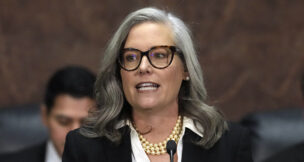Campaign finance laws make funding of election challenges murky
Kiera Riley Arizona Capitol Times//November 1, 2024//
Campaign finance laws make funding of election challenges murky
Kiera Riley Arizona Capitol Times//November 1, 2024//
Funds fueling state candidate election challenges remain shrouded by Arizona’s campaign finance code, while congressional candidates’ funding is made fairly transparent by the Federal Election Commission.
A gap in reporting requirements between state and federal campaign finance laws has not drawn much ire from either side of the aisle beyond some raised eyebrows on who is financing litigation that electrified last cycle and is sustaining a pulse well into 2024.
As another round of election litigation looms ahead, a slight split still exists on whether disclosure is necessary.
Election attorneys said a nexus between legal funding and obligation under state campaign finance law was nonexistent given its jurisdiction over money meant to influence the election, while a campaign finance legal group previously advised the state to seek further disclosure, given the potential for quid pro quo.
Under state law, legal expenses fall outside the definition of a campaign contribution and expenditures, effectively allowing unlimited contributions from any domestic source to cover the cost of litigation and granting candidates and committees an out from reporting legal fees.
The first iteration of the legal fee exemption was originally penned in a 2011 opinion by then-Attorney General Tom Horne.
Former Sen. Steve Pierce, R- Prescott, asked Horne to weigh in on whether donations made for the sole purpose of covering a candidate’s legal expenses in relation to defending a candidate petition challenge would be considered a contribution in state statute.
Horne noted state law defined contributions as “anything of value made for the purpose of influencing an election,” and found legal defense of a signature challenge to fall outside the bounds, noting state courts have previously interpreted “influencing an election” as applying “to donations made to support express advocacy on behalf of a candidate.”
He further noted, per state law, Clean Elections candidates could not use public funds for legal expenses but could accept private funding through legal defense funds, creating further legal foundation for a legal contribution cut out.
“Because publicly financed candidates face severe restrictions on the acceptance of private campaign contributions, the allowance of private funding for a legal defense fund implies that such funds are not contributions,” Horne wrote in a footnote.
In the Legislature’s 2016 retooling of campaign finance laws, legal expenses were then explicitly exempted from the definition of contributions and expenditures, essentially sparing candidates and committees from reporting any contributions received or expense spared on litigation.
In receiving contributions, candidates do not have to set up a formal legal defense fund to take in private contributions, but some do.
Gubernatorial candidate Kari Lake set up a Save Arizona Fund, a legal defense fund fashioned as a nonprofit, to feed her challenge to her 2022 gubernatorial loss.
Attorney General candidate Abe Hamadeh does not have an established legal fund, but Kris Mayes sought contributions for legal fees accrued in defending against Hamadeh’s election contest.
In the process of litigation, courts have ordered both Lake and Hamadeh to pay attorneys fees. The Arizona Supreme Court sanctioned Lake’s attorneys $2,000, while Hamadeh was ordered to pay a $55,000 sanction to cover attorneys fees for Mayes and Secretary of State Adrian Fontes.
Both Lake and Hamadeh’s respective election litigations are still running up a tab, with both cases now in front of the Arizona Supreme Court. Meanwhile, Lake and Hamadeh are running for seats in the U.S. Senate and House of Representatives, respectively.
In contrast to the state’s rules on reporting campaign finance, federal candidates are required to report the flow of legal funds, as are the national party committees often sponsoring litigation.
Per the Federal Election Commission, candidates can use funds raised for legal fees so long as the litigation is “related to campaign or officeholder activity, where such expenses would not have occurred had the individual not been a candidate or officeholder.”
The FEC cites such examples as expenses incurred over the course of securing ballot access, defending against a lawsuit directly tied to campaign activity or candidate status or paying an opponent’s attorneys fees, granting some insight into candidate expense on legal services.
Since announcing her candidacy for the Senate, Lake has paid $89,605 for legal consulting to Elections LLC, a law firm headed by Stefan Passantino, former deputy White House counsel to then-Presiddent Donald Trump.
Her campaign also contributed $190,000 to the National Republican Senate Committee’s legal account, via Sheehy Victory Committee.
Since July 2023, Lake’s Democopponent Ruben Gallego has spent about $72,980, with $46,396 to Arizona-based firm Herrera Arellano and $26,584 going to DC-based Elias Law Group.
Beyond independent fundraising, candidates can mount legal defense funds too or rely on national party committees, which typically stockpile cash to fund any legal efforts post election.
“Generally, they’re sitting on a bucket of cash that they can use for important litigation after the fact,” Republican attorney Cory Langhofer said.
A candidate may opt to go through the RNC or DNC as committee’s accounts see higher contribution limits than a candidate committee. For instance, where an individual could donate $3,300 per election to a candidate committee, they could donate $123,900 per party committee account per year.
Since January, the RNC has paid out $433,859 to Statecraft, $40,039 to Snell and Wilmer and $15,910.97 to attorney Kurt Altman in legal and compliance fees.
In the same time frame, the DNC shelled out $406,478 to Herrera Arellano for legal services and $27,064 to Coppersmith Brockelman. Legal fees can also flow through political action committees. Nonprofits can foot the bill, though with 501(c)3’s eligible to weigh in on more of a general election integrity issue and 501(c)4’s able to wade into candidate and political litigation.
With post-general election and end-of-the-year campaign finance deadlines, reports could eventually shine some light on legal funding, in case a Senate or congressional candidate files an election contest.
Any look into state litigation funding, however, will only come given voluntary disclosure.
The disparity between state and federal disclosure begs the question of whether Arizona’s legal expense exemptions span too wide.
In a 2021 report weighing in on Arizona’s campaign finance laws, Campaign Legal Center found the exemption of legal expenses from reporting requirements “undercut electoral transparency.”
“(I)f an Arizona candidate amasses millions of dollars in legal or accounting expenses for any purpose, a donor may pay those costs without the candidate’s campaign ever having to disclose the donor’s payment on public reports,” the report read. “In short, these exemptions create a backdoor for secret quid pro quo exchanges in Arizona politics and deny the public important information about money raised and spent by candidates and committees.”
Campaign Legal Center recommended “to prevent abuse and ensure more transparency about who is spending money to benefit candidates and committees … narrowing the exemption only to cover legal or accounting costs paid by the regular employer of the individual rendering the services, and only if the services are related to compliance with state election law.”
But some attorneys see it differently, noting legal activity generally falls outside of the scope of campaign finance.
Campaign finance/election attorney James Barton said, “If you think about it, campaign finance law is really designed to regulate and to track and to provide transparency around efforts to influence the electorate.”
He continued, “Legal work, generally speaking, is not that.”
In discussing the potential of “quid pro quo,” as cited by Campaign Legal Center, Barton said, “I think it would be disingenuous to suggest there’s never a way that paying someone’s legal bills could result in quid pro quo. Of course it could,” Barton said. “I just think before we start talking about ‘let’s regulate that too’ we need to think about what’s the cost of that regulation?”
Langhofer acknowledged the possibility, too, but said he thought it was not likely.
“If you want to influence candidates, there’s a lot easier ways than paying a six figure legal bill.”








































